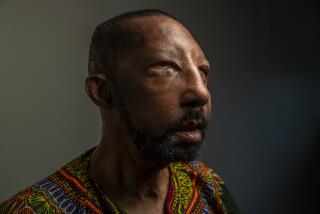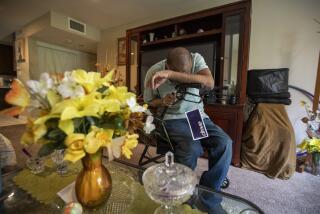Woman, 22, Is Rare Patient for Surgery
- Share via
GARDEN GROVE — Jodi Riddle, 22, became the nation’s second person with Down syndrome to be approved for an organ transplant.
Pending the stabilization of a thyroid condition, the Garden Grove resident will be placed on the United Network for Organ Sharing list to receive a heart-lung transplant at UC San Diego Medical Center.
Riddle’s health began to worsen about a year ago because of complications from a congenital heart condition. Doctors told her mother, Debra Stinson, that Riddle needed a complete heart and lung transplant.
But Riddle’s cardiologist at the time told Stinson that there was no transplant list for Jodi because she has Down syndrome, a congenital condition where the presence of an extra chromosome disrupts the body’s development and leads to mental retardation, among other problems.
“He said it was because she wasn’t a productive person,” Stinson said. “It hurt and angered me, and I just wasn’t going to take no for an answer.”
In April, a family member pointed out a newspaper article about Sandra Jensen of Sacramento, a 35-year-old woman with Down syndrome. After being refused twice for a heart-lung transplant, Jensen is believed to be the first seriously retarded person in the United States to receive a major transplant.
Inspired by Jensen’s story, Stinson sought the help of the Regional Center of Orange County, which acted as a liaison between Stinson and doctors, and Protection and Advocacy Inc., a publicly funded disability rights organization.
Attorney Michael Kluk helped Stinson prepare a letter to Riddle’s cardiologist informing him of recent legislation making it illegal for transplant centers to discriminate on the basis of physical or mental disabilities. The cardiologist wrote a referral for Riddle so that she could be evaluated by UC San Diego.
“Frankly, just because people are doctors, it doesn’t mean that they’re necessarily educated about the capabilities of people with disabilities,” Kluk said. “They carry the same misconceptions that many other people do.”
On Feb. 13, Riddle was told she was accepted once her thyroid condition, which her current cardiologist described as “not serious,” stabilized.
In accepting patients, transplant centers consider whether or not patients--or their caregivers--are able to follow through on post-operative care, said Joel Newman, spokesman for the United Network for Organ Sharing.
“The issue has always been, can a family member care for this patient? Are they able to take medications?” he said.
Garden Grove Dr. Stanley M. Kegel, Riddle’s cardiologist, said that whether the transplant will be successful is impossible to tell because there are so few documented Down transplant cases.
“It will take 20 or 30 cases before we know,” Kegel said. “But Jodi will become as much a symbol for Down patients as Sandra has become.”






